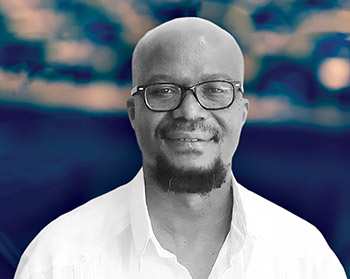Latest News Archive
Please select Category, Year, and then Month to display items
12 January 2024
|
Story Nonsindiswe Qwabe
|
Photo Sonia Small
 Since joining the UFS in 2008, Dr Grey Magaiza has worked extensively on approaches that can foster the socio-economic transformation of societies.
Since joining the UFS in 2008, Dr Grey Magaiza has worked extensively on approaches that can foster the socio-economic transformation of societies.
“The future should be one where communities can decide on their development agenda and futures. That’s the most important for me.” Dr Grey Magaiza, Deputy Director of the Centre for Gender and Africa Studies (CGAS) and Head of the Community Development programme on the Qwaqwa Campus, is passionate about capacitating communities to be agents of change and advancement. His vision for the future emphasises the empowerment of communities to take charge of their development by actively participating in decision making and the implementation of development projects that can improve their lives.
Since joining the UFS in 2008, Dr Magaiza has worked extensively on approaches that can foster the socio-economic transformation of societies. Over the years, he has crafted his research speciality into one that he is most proud of – being an interdisciplinary scientist immersed in the development of communities.
“I’m in a fortunate position of researching what I like. I say ‘fortunate’, because I’ve taken the time to understand what I’m passionate about, which is the overall field of rural livelihoods and livelihood futures – in short, community development. My research starts from an engaged university, understanding the elements that a university must use to enhance transformation and relevance to its immediate community in terms of development.”
One of the ways he has done this is by looking at social entrepreneurship as a development approach for young people in a rural setting. Through workshops with non-profit and civic organisations in Qwaqwa, Dr Magaiza has been helping these organisations to map out their needs and actively meet them through the involvement and support of external role players.
“We understand that communities are part of the national development agenda, but even that national agenda respects community knowledge and intentions and allows communities to shape their identity. A critical enabler of this is community organising. You bring back the capacity in communities to have dialogues on issues affecting them as spaces for engagement, knowledge exchange, and for people to just talk about their way forward.”
By enabling communities to define their development agenda, they can address their specific needs, challenges, and aspirations, he said. “When I look at livelihood futures, it’s quite an exciting aspect of my work – it’s like looking into a fortune tellers’ globe, because you’re not deciding for communities what they should do, but the communities themselves take those decisions.”
Trade unionist brings today’s policy issues to the table
2017-01-02

Sidney Kgara currently heads the public-sector union of
Nehawu’s Policy Unit
Photo: Supplied
Sidney Kgara was appointed to the University of the Free State (UFS) Council in January 2015. He was appointed to the Council by Blade Nzimande, the Minister of Higher Education and Training, in one of three such positions.
Sidney heads the public sector union Nehawu's Policy Unit. The National Health Education and Allied Workers Union is the biggest public-sector union and the biggest union in the public service coordinating bargaining council. It therefore stands to reason that researching and drafting policy on issues such as labour market matters, public health and developments in higher education form the core responsibilities of the unit.
No stranger to university governance and leadership
Nehawu has a number of members working at the UFS and before his appointment, Kgara's only contact with the university was through its UFS members. However, he is no stranger to university governance and leadership. He was a student leader at the University of KwaZulu-Natal in the 1990s and as a result has a broad understanding of student governance and university issues.
"Even though it was a different time and the circumstances were different, there is some sense of continuity to the issues we had to deal with then, and the issues that the university faces now," he says.
Kgara’s unique and valuable contributions to the Council
This, together with his experience in policy and research, enables Kgara to make a unique and valuable contribution to the Council.
Kgara is an avid reader and stimulating his mind through reading makes him truly happy. He also loves watching sport and enjoys socialising with friends.